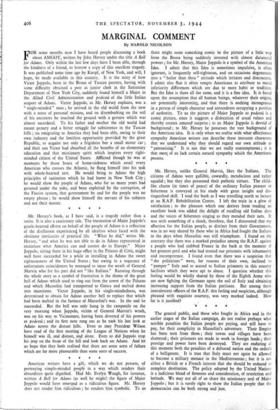Mr. Hersey's book, as I have said, is a tragedy
rather than a satire. It is also a cautionary tale. The frustration of Major Joppolo's gentle-hearted efforts on behalf of the people of Adano is a reflection of the disillusion experience4 by all idealists when faced with the obstinate intricacies of practical life. " What he did," writes Mr. Hersey, " and what he was not able to do in Adano represented in miniature what America can and cannot do in Europe." Major Joppolo, sitting there in his huge office in the Palazzo di Citta, might well have succeeded for a while in installing in Adano the sweet righteousness of the United States ; but owing to a sequence of unfortunate coincidences he managed to incur the wrath of General Marvin who for his part did not " like Italians." Running through the whole story as a symbol of frustration is the theme of the great bell of Adano which used to ring out from the tower of the Palazzo and which Mussolini had transported to Genoa and melted down into munitions. Victor Joppolo, in his single-mindedness, was determined to obtain for Adano another bell to replace that which had been melted in the furnace of Mussolini's war. In the end he succeeded. But thr bell was only hung in the campanile on the very morning when Joppolo, victim of General Marvin's wrath, was on his way to Vicinamare, having been divested of his powers as podesta; and its first note rang out as he took his last look at Adano across the distant hills. Even so may President Wilson have read of the first meeting of the League of Nations when he himself was ill, and distant, and alone. Even so did Joppolo stop his jeep on the broyv of the hill and look back on Adano. And let us hope that they both realised that there are some sorts of failure which are far more pleasurable than some sorts of success.


























 Previous page
Previous page